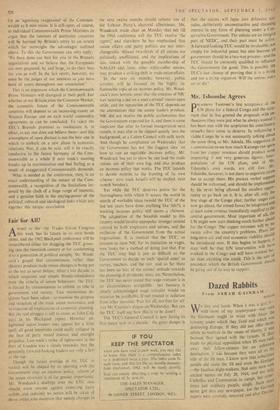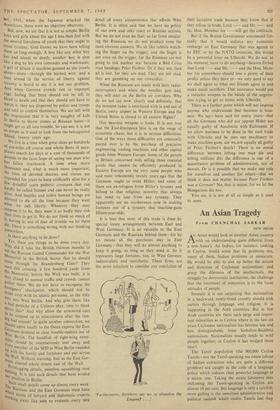Dazed Rabbits
From SARAH GAINHANI WE live and learn. When 1 was a girl, I-- with most of my countrymen—was sure the Germans ought to resist with force the tyranny under which they lived and which was destroying Europe. If they did not offer them- selves as martyrs in the cause of liberty, it 05 because they 'agreed with the tyrants. If theY made no physical opposition when SS men tools away their fellow-citizens for an unknown destination, it was because they were all on the side of the SS men. I know now that sometimes people did resist the SS and even the 6-cst313,° —the faceless night-walkers. Not only men with ancient names on July 20, 1944, and not °rib' Catholics and Communists in camps, but OW; times just ordinary people, singly. Such WE live and learn. When 1 was a girl, I-- with most of my countrymen—was sure the Germans ought to resist with force the tyranny under which they lived and which was destroying Europe. If they did not offer them- selves as martyrs in the cause of liberty, it 05 because they 'agreed with the tyrants. If theY made no physical opposition when SS men tools away their fellow-citizens for an unknown destination, it was because they were all on the side of the SS men. I know now that sometimes people did resist the SS and even the 6-cst313,° —the faceless night-walkers. Not only men with ancient names on July 20, 1944, and not °rib' Catholics and Communists in camps, but OW; times just ordinary people, singly. Such never got into any newspaper, for the Germain, papers were carefully censored and after Dcccn
THE SPECTATOR, SEPTEMBER 7, ber, 1941, when the Japanese attacked the Americans, there were no objective observers.
But, now, we see that it is not so simple. Berlin boys and girls about the age I was then feel with the absurd literalness of youth that they ought to resist tyranny; God knows we have been telling them so long enough. A boy like any other boy lies and bleeds to death; another boy is shot like a dog by his own comrades and workmates; a girl of fifteen is machine-gunned as she crawls alone—alone—through the barbed wire; and a man armed in the service of liberty against tYranny is heard to say it is not our problem. And when German crowds riot in impotent rage, feeling that boys should not be left to bleed to death and that they should not have to Watch it, they are dispersed by police and troops and told to control themselves. We are left with the impression that it is very naughty of kids In Berlin to throw stones at Russian buses—it might get us all into trouble. So you see, it is not so simple as it used to look from the beleaguered Island, twenty years ago. We live in a time when great ships go hundreds of sea-miles off course and whole fleets of aero- Planes search for days at a cost of thousands of Pounds in the faint hope of seeing one man who has fallen overboard. A time when more thousands and, what is much more important, the lives of devoted doctors and nurses are expended for years to keep artificially alive for a few dreadful years pathetic creatures that can hardly be called human and can, never be really alive- And healthy and active human beings are allowed to die all the time because they want What we call liberty. Whatever they may stIPPose it to be, they want it so badly they risk !heir lives to get it. We do not think so much of 1.!, having it; out of fear of trouble we let them ate. There is something wrong with our thinking somewhere.
Is there anything to be done?
Y-es, there are things to be done every day. hY did it take the British thirteen months to r`ell the Russian Guard Commander for the War „ ivrenloriaI in the British Sector that he should e°Me through the Brandenburg Gate? They used this crossing, a few hundred yards from the Memorial, before the Wall was built; it is "w closed to normal traffic and crowds cannot father there. We do not have to recognise the c)reigriers' checkpoint, which should not be made cosy with its idiotic pet-name, as the only ,.. :aY into West Berlin. And why give them, like abbad pastiche of a Ustinov play, time to think to °Ill this? And why allow the armoured cars in he stepped up to nine-tonners after the riot- g had ceased? In quite another connection, we should agree loudly to the Osten express the East vverMans demand to clear trouble-makers out of /11;ef Berlin. The handfuls of right-wing extre- e \:s should be ostentatiously sent away and erY Member of the SED in West Berlin rounded ) With his family and furniture and put across the e Wall. Without warning. Just as the East Ger- mans whole streets east of the Wall. pettifogging details, pointless squabbling over noon lag. It is just such details that have eroded '4.; position in Berlin. TheLich small details come up almost every week. Whole Russians and the East Germans must have vi,ie teams of lawyers and diplomatic experts "°1-ing away like ants to evaluate every tiny
detail of every circumstance that affects West Berlin. It is often said that we have no policy of our own and only react to Russian actions. But we do not even do that; so far from emulat- ing the Russians we do not produce even the most obvious answers. We sit like rabbits watch- ing the finger on the trigger; and the finger is not even on the trigger, for the Russians are not going to risk nuclear war because a Red Cross man bandages Peter Fechter. Or if they are, then all is lost, for they are mad. They are not mad, they are gambling on our cowardice.
When the Russians are ready with their radar- interruptors and when the weather gets bad, they will start on the Berlin air corridors. Why do we not say now, clearly and definitely, that the moment radar is interfered with in and out of Berlin, every airport in Western Europe and the United States is closed to all eastern flights?
Our heaviest weapon is trade. It is not true that the East-European bloc is on the verge of economic chaos; but it is in serious difficulties. One of the ways those difficulties are constantly pasted over is by the purchase of precision engineering, tooling machines and other capital goods from Western Europe. Some of the people in Britain concerned with selling these essential goods that cannot be efficiently produced in Eastern Europe are the very same people who said most vehemently twenty years ago that the Germans ought to resist Hitler; and some of them are ex-refugees from Hitler's tyranny and belong to that religious minority that always has most to lose from any tyranny. They apparently see no incoherence now in making fortunes out of a tyranny that machine-guns fifteen-year-olds.
It is true that most of this trade is done by special treaty arrangements between East and West Germany. It is so valuable to the East Germans and the Russians behind them—for by no means all the purchases stay in East Germany—that they will do almost anything to keep it going, as long as they need it. So it represents large fortunes, too, to West German industrialists and merchants. These firms are the more reluctant to consider any restriction of
'Furthermore, Brothers, are we to abandon the Empire? . .
their lucrative trade because they know that if they refuse to trade, Lord and Mr. — and the Hon. Member for will get the contracts.
But if the British Government announced for- mally that it would enforce any economic embargo on East Germany that was agreed to by EEC or by the NATO countries, this would be a powerful lever on Ulbricht. We do not, at the moment, have to do anything—heaven forbid that Lord and Mr. and the Hon. Mem- ber for somewhere should lose a penny of their profits unless they have to—we only need to say we shall agree to what our friends agree to and make equal sacrifices. That assurance would put a valuable weapon in the hands of the negotia- tors trying to get to terms with Ulbricht.
There is a further point which will not impress anyone who understands that business is busi- ness. We say—have said for many years—that all the Germans who did not oppose Hitler are equally guilty of Auschwitz with Eichmann. If we allow business to be done in the steel trade with Ulbricht and he uses our machinery to make machine-guns, are we-not equally all guilty of Peter Fechter's death? There is no moral difference between letting one man die and letting millions die; the difference is one of a quantitative problem of administration, not of morals. Or is it possible that we make one rule for ourselves and another for others—that we think it does not matter because Peter Fechter was a German? No, that is unjust, for we let the Hungarians die too.
You see, it is not at all as simple as it used to seem.



































 Previous page
Previous page